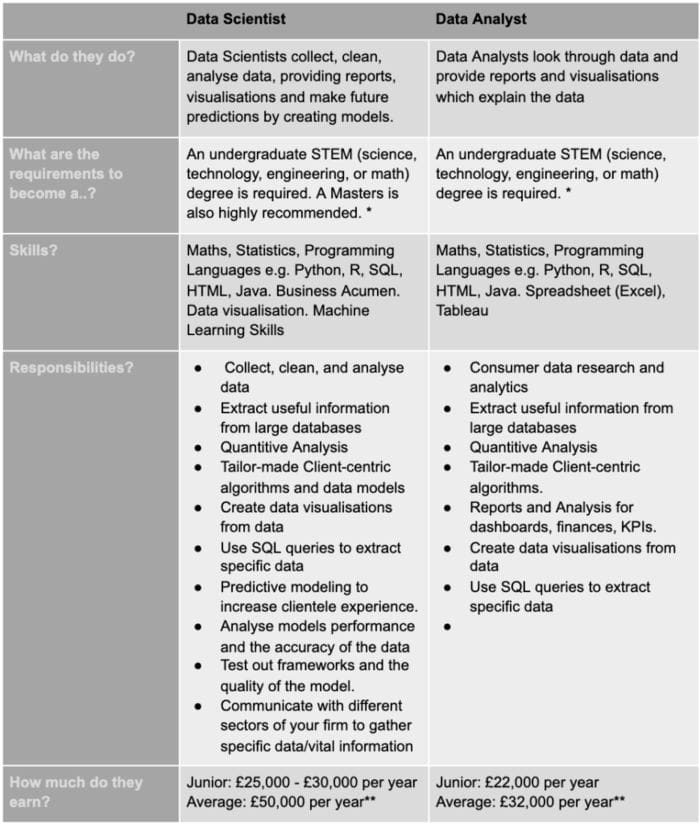What’s the difference between a Data Scientist and a Data Analyst?
Find out the major differences between a Data Analyst and a Data Scientist, and read the author's pointers on what they would recommend you to do if you wish to make that transition from Data Analyst to Data Scientist.

"A data scientist is a person employed to analyse and interpret complex digital data, such as the usage statistics of a website, especially in order to assist a business in its decision-making."
—Oxford Dictionary
"A data analyst is a professional who works with data to provide insights, they take raw or unstructured data and come up with analyses that produce digestible results that executives and others can use to make decisions."
—Techopedia
"A data scientist is someone who can predict the future based on past patterns whereas a data analyst is someone who merely curates meaningful insights from data.
So now that we have definitions, I think the best way to really understand the difference between the two is to draw up comparisons.

* This is recommended. There are other routes to become a Data Scientist/Analyst. Check out my previous post.
Transitioning from a Data Analyst to a Data Scientist
Although their many similarities between the two career paths, there are also many differences as well. The higher pay that Data Scientists receive comes with more responsibility. This extra responsibility entails more studying, more knowledge, and more practicing your coding skills.
Below are a few pointers on what I would recommend you to do if you wish to make that transition from a Data Analyst to a Data Scientist.
Play the role of a Data Scientist.
If you’ve made the decision to transition into a Data Scientist, you must have done a lot of extra reading to fully understand what it entails to become a Data Scientist. You will go from describing trends in your data to uncover new data using your existing data and build machine learning models to support your hypothesis.
Data Scientists:
- Spend a lot of their time cleaning data using languages like Python or R.
- Build predictive models using machine learning algorithms such as gradient boosting, linear regression, logistic regression, decision trees, Random Forest, and more.
- Evaluate the models they create to get a high percentage accuracy in order to validate the analysis
- Test and improve the accuracy of already built ML models.
- Build visualizations to narrate the advanced analysis result.
Develop your skills.
As a Data Analyst, you may not be coding every day. Your job requirements involve you coding and use your technical skills, however, some of your time may be allocated elsewhere, e.g. identifying trends to aid business decisions. As a Data Scientist, have the ability to code is vital as you will be doing it most of your time along with having the comfortability of switching and using different programming environments. This may require you to understand the syntax of different programming languages that are used frequently such as R, Python, and Java.
Data Analysts use very minimal Mathematical and Statistical approaches than Data scientists. So brushing up on your Maths and Stats will highly benefit you as you will have to apply this knowledge in your day-to-day life. You will have to write algorithms from scratch and fully understand how these machine learning algorithms work.
The more coding you do, the more programming languages you learn, the better Data Scientist you will become. You can do both the above points by practicing your code, creating side projects, involving yourself in code challenges such as Kaggle, LeetCode, and more. The only way you will know if you can become a Data Scientist, is to practice living the life of a Data Scientist.
I hope this had helped you give some insight on the difference between the two roles and guidance if you are planning to transition from a Data Analyst to a Data Scientist.
This article was originally published on AI Time Journal.
Bio: Nisha Arya Ahmed is a young data scientist, who wishes to explore the different ways that Artificial Intelligence can help benefit the longevity of human life and conquer terminal illnesses. Nisha would also like to explore peoples opinions on Artificial Intelligence and what they believe it brings or does not bring to the table.
Original. Reposted with permission.
Related:
- Data Scientist Career Path from Novice to First Job
- 5 Things That Set a Data Scientist Apart From Other Professions
- Don’t Waste Time Building Your Data Science Network
